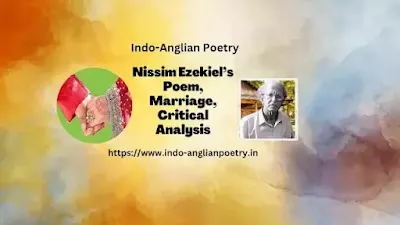In “Marriage”, one of his finest lyrics, Ezekiel vividly portrays the two stages of growth in a marriage. The first is the stage of love, joy, honeymoon, ecstasy and illusion, which is invariably followed by frustration and disillusionment. The initial joy and excitement is described as follows:
 |
| Nissim Ezekiel’s Poem | Marriage | Critical Analysis | |
“Lovers, when they marry face
Eternity with touching grace,
Complacent at being fated
Never to be separated.”
But the illusion of ecstasy gradually vanishes. The ironic laugh of the poet is obvious in the next lines:
“The bride is always pretty, the groom
A lucky man. The darkened room
Roars out the joys of flesh and blood.
The use of nakedness is good.
I went through this believing all,
Our love denied the Primal Fall.”
Wordless we walked among the trees,
And felt immortal as the breeze.”
It seems that the lust will never end. Ezekiel uses apt words which reveal the depth of idea. The word “grace” has religious associations. “They touch eternity with grace” conveys the idea of endless joy. The second stanza shows evocatively all the joys of the body. The love experience was so absorbing at the beginning that the idea of man's fall from grace seemed incredible. The last two lines quoted above describe beautifully the silent communion that lovers attain.
Ezekiel does not ignore the harsh realities of married life. The initial ecstasy was short - lived. The first flush of marital joy vanishes into nothingness. Sooner than later, the inevitable stage of disillusionment, marked by frequent quarrels, begins. The initial excitement is followed by the feeling of satiation:
“However many times we came
Apart, we came together. The same
Thing over and over again.”
Ezekiel reveals the disillusionment and frustration of married life vividly through two Biblical allusions. The lovers’ fall from their fanciful and romantic paradise is likened to the original fall of Adam and Eve from Eden. The restlessness and violence in married life is compared to the curse of Cain who murdered his own brother, Abel, and was cursed to move endlessly and restlessly:
“Then suddenly the mark of Cain
Began to show on her and me.”
The poet feels that unlike his, other men's marriages are going strong. He does not intend spoiling their marriages by revealing to them his own disillusionment, frustration and bitter experiences. So he poses himself a rhetorical question:
“Why should I ruin the mystery
By harping on the suffering rest,
Myself a frequent wedding guest.”
The poet considers himself to be a modern Cain, who is destined to wander and remain unsatisfied. Though he is tragically aware of his own fate, he prefers not to reveal it. He assumes a happy role before the world. Why should he spoil the mystery that the newly married couples have to experience personally. So he enjoys his role as “a frequent wedding guest”. Like Coleridge's Ancient Mariner he emerges as “a sadder and a wiser man.”
“Marriage” is a confessional poem. P. M. Chacko remarks: “The confessional candour with which Ezekiel exposes his home life is an index of his courage to explore truth in a very personal way. He depends solely on first-hand experiences to discover and uncover truths from the home front. While other writers try to camouflage and cover up the bitter truths of domestic life, Ezekiel pursues them relentlessly in spite of possible misunderstandings. But that is the price he has to pay for having sworn to discover the truth about his self in domestic relationship.” (" Ezekiel's Family Poems”, JIWE, Vol. 14, No. 2, July 1986, p. 27).
